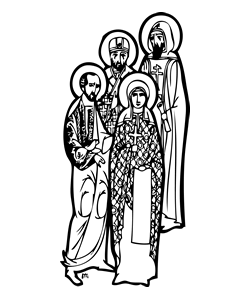|
|||
|---|---|---|---|
| This weekly bulletin insert complements the curriculum published by the Department of Christian Education of the Orthodox Church in America. This and many other Christian Education resources are available at http://dce.oca.org. | |||

Genesis and the Letter to the Hebrews were written in times very different from each other. Nevertheless, they show us that we are all together as sons and daughters of the same God—the people of the Old Testament, and we the people of the New Testament or New Covenant. One verse that reflects this is Hebrews 11: 26. The preceding verses briefly tell Moses' personal history: he was a "beautiful child" and his parents hid him to escape the Egyptian Pharaoh's edict that every male child born to the Hebrew slaves was to be killed, drowned in the Nile. But when he grew up, "by faith" he refused to be called the son of Pharaoh's daughter, who had saved him from the river and raised him. He chose to share the sufferings of the Hebrews, having discovered that he was one of them. Then verse 26 tells us: "He considered abuse suffered for the Christ greater wealth than the treasures of Egypt, for he looked to the reward." What does it mean that the writer of Hebrews speaks of Moses suffering "for the Christ" when Moses lived long before Christ came, and certainly did not personally know Him? Moses had not heard Christ speak the message of salvation, so how could he be looking "to the reward?" The answer is that the writer of Hebrews, like all Christians, knows that Moses and the faithful people of the Old Testament were part of Christ's flock, even though in their lifetimes He had not yet become Man and lived in the world. Later verses in the same reading give us more names from the Old Testament, and refer to them as a "cloud of witnesses" for us, urging us to run the race set before us so that we, with them, may be made perfect. We are tied to these earlier people by the promise they share with us, though they did not actually hear the promise from the lips of the Son of God. Hebrews 3: 12-16 is a warning to believers not to "fall away from the living God." They are to help one another, exhorting each other every day so that none of them will be "hardened by the deceitfulness of sin." We are tied together not only by the shared promise, but by our responsibility to each other, making sure that each one of us can "hold our first confidence firm to the end." This emphasis on mutual help and support tells us the answer to one of the Bible's best-known questions. In Genesis 4: 9 Cain answers God by asking about his brother Abel, "Am I my brother's keeper?" For members of God's family, from Moses' time up to our own, the answer must be "yes." |
|||
